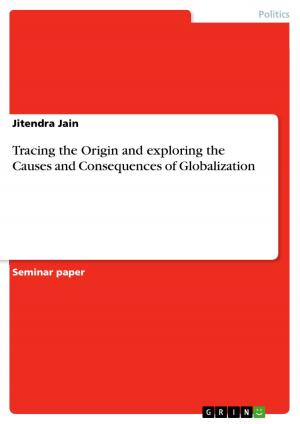Terror Management Theory: What role do Cultural World Views play in the cause and prevention of terrorism?
Nonfiction, Health & Well Being, Psychology, Cognitive Psychology| Author: | Roman Prinz | ISBN: | 9783640917181 |
| Publisher: | GRIN Publishing | Publication: | May 17, 2011 |
| Imprint: | GRIN Publishing | Language: | English |
| Author: | Roman Prinz |
| ISBN: | 9783640917181 |
| Publisher: | GRIN Publishing |
| Publication: | May 17, 2011 |
| Imprint: | GRIN Publishing |
| Language: | English |
Bachelor Thesis from the year 2010 in the subject Psychology - Cognition, grade: 1.6, Maastricht University (Faculty of Psychology and Neuroscience), language: English, abstract: The issue of worldwide terrorism has gained increased attention during the 20th and 21st century, but there exists an obvious lack of long-term solutions and prevention to this problem. In order to develop preventive methods, a root cause analysis is of highest necessity. Subjectively interpreted values, beliefs and perceptions held by a group or culture often build the basis for the development of aggression towards out-group members. The Terror Management Theory (TMT) is a metatheoretical perspective, concerned with which motivational systems underlie the key psychological structures that could be central to the causes and consequences of terrorism (Landau, Miller, 2005). TMT argues that the subscription to a certain Cultural World View (CWV) serves an anxiety buffering function, by offering stability through a set of beliefs that helps one understand the nature of life and reality. This buffering and structuring function is weakened by the mere existence of a differing, competing CWV and herein lies TMT's explanation for conflicts between different CWVs. This paper reviews the results of 7 empirical studies on TMT in order to imply insights from TMT to the cause and possible methods of prevention to terrorism. Furthermore the results are linked to the 'Staircase to Terrorism' (Moghaddam, 2005). The conclusion is drawn, that Cultural World Views play an important role in the causation of terrorism. Moreover, preventive approaches based on the insights gained in this paper can be developed.
Bachelor Thesis from the year 2010 in the subject Psychology - Cognition, grade: 1.6, Maastricht University (Faculty of Psychology and Neuroscience), language: English, abstract: The issue of worldwide terrorism has gained increased attention during the 20th and 21st century, but there exists an obvious lack of long-term solutions and prevention to this problem. In order to develop preventive methods, a root cause analysis is of highest necessity. Subjectively interpreted values, beliefs and perceptions held by a group or culture often build the basis for the development of aggression towards out-group members. The Terror Management Theory (TMT) is a metatheoretical perspective, concerned with which motivational systems underlie the key psychological structures that could be central to the causes and consequences of terrorism (Landau, Miller, 2005). TMT argues that the subscription to a certain Cultural World View (CWV) serves an anxiety buffering function, by offering stability through a set of beliefs that helps one understand the nature of life and reality. This buffering and structuring function is weakened by the mere existence of a differing, competing CWV and herein lies TMT's explanation for conflicts between different CWVs. This paper reviews the results of 7 empirical studies on TMT in order to imply insights from TMT to the cause and possible methods of prevention to terrorism. Furthermore the results are linked to the 'Staircase to Terrorism' (Moghaddam, 2005). The conclusion is drawn, that Cultural World Views play an important role in the causation of terrorism. Moreover, preventive approaches based on the insights gained in this paper can be developed.















